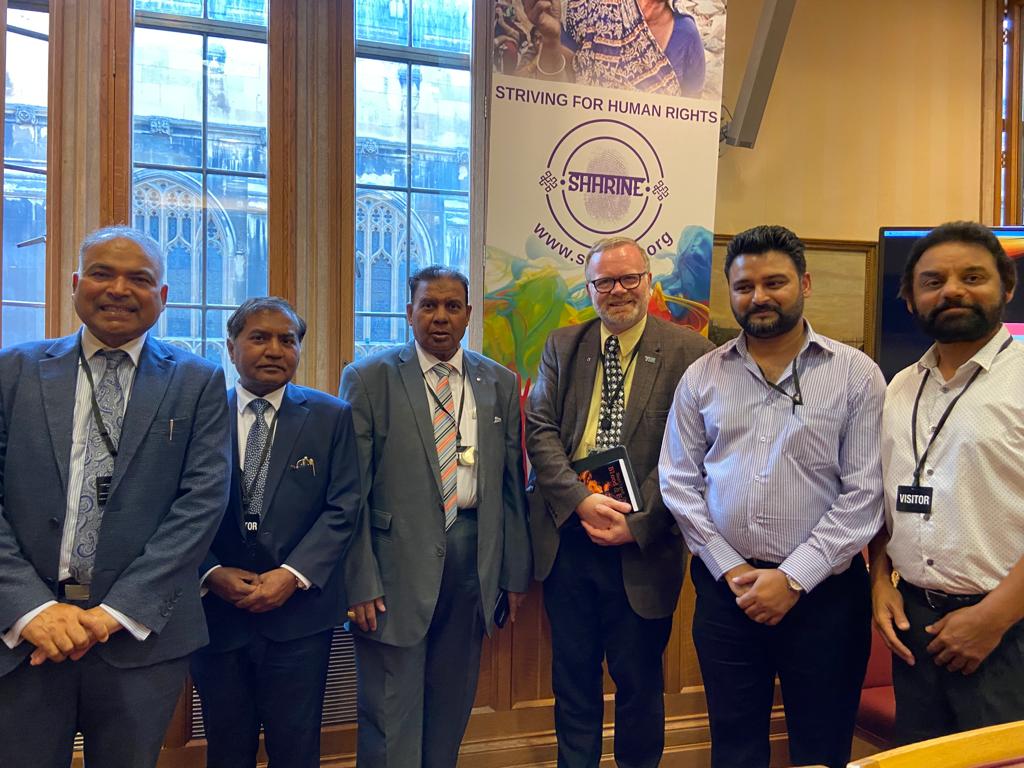News Desk
The Pakistan Minority Rights Commission was represented by Gerald Vincent Singh, the UK coordinator.
In attendance were representatives of the British Hindu and Christian communities of Pakistan, with Hon. Jim Sharron MP for Strangford and Hon. Martyn Day MP for Linlithgow and East Falkirk gracing the proceedings.
Mr. Gerald Singh highlighted a significant concern related to Pakistani textbooks that foment hatred by glorifying foreign invaders who dismantled Hindu Temples centuries ago. This curriculum is deeply humiliating for Pakistani Hindus.
Whenever we witness the destruction of places of worship such as Temples and Churches in Pakistan, it serves as a stark reminder of Ghaznavi’s or other warlord invasions in peaceful settlements, and very often such incidents are repeating because this is what is being taught in schools. Therefore, the vast majority feels it is their duty to destroy worship places. Moreover, Pakistani Hindu students learn, listen, and write down this distorted and humiliating history with their own hands.
Mr. Singh passionately urged the British government to demand that Pakistani authorities eliminate such fabricated material, as it indoctrinates generations to come. He added, “A recent video clip went viral on social media in which an interviewer asked a Pakistani student, ‘India has reached the south pole of the Moon, what would you like to say?’ The child responded, ‘No matter if India reaches the moon or any other planet, but it’s for sure we will go to paradise, and it is made for us.”
Mr. Singh stressed that these indoctrinated views are not confined to homes but are also propagated by school textbooks, playing a pivotal role.
Hence, from the above statement, we see that this absurd mindset has been transmitted to children, promoting intolerance and a lack of coexistence with other faiths.
In stark contrast, when it comes to enforcing laws, we have observed that the Pakistani governmental apparatus is powerful enough to swiftly apprehend the culprits of the core commander residents’ incidents that occurred on the 9th of May.
However, we question what is preventing the Pakistani establishment from apprehending the wrongdoers responsible for the August 16th Jaranwala incident.
Gerald also added, “The British government must establish a rating standard similar to the IMF before granting financial aid to Pakistan. British taxpayers do not intend for their funds to protect extremist outfits nurtured and supported by the state from time to time. If the state can dismantle a political party of Imran Khan’s, what impedes them from dismantling extremist organisations like Thareek-e-Labek Pakistan?”
The UK government should impose conditions on Pakistan. If the state cannot protect the rights of minorities and continues to disregard human rights violations, then the UK government should withhold any aid or financial assistance intended to support Pakistan’s struggling economy. This is the only way to compel Pakistan to take genuine preventive measures to end attacks on religious minorities, Mr. Singh emphasised.
The meeting also featured prominent speakers, Dr. Akhtar Injeeli and Mr. John Basco.
Dr. Akhtar recounted a harrowing series of incidents and brutality dating back to 1997, where innocent Christians fell victim to diabolical laws, infamously known as Blasphemy laws, essentially a license to kill. He added that after celebrating the independence day of Pakistan, the dark history repeated on the 16th of August at Jaranwala where the peaceful settlement of Christians and numerous churches were destroyed and burnt or razed to the ground.
Mr. John Bosco added another dimension by highlighting the misuse of Blasphemy laws to settle personal vendettas, especially to suppress minorities. He strongly emphasised the importance of including unsung Christian heroes in Pakistani textbooks to educate students from the majority about the concepts of diversity and interfaith harmony. Presently, the majority of students in Pakistan do not know the contribution of Christians in the establishment of Pakistan and their subsequent contributions in different fields, especially in the armed forces, education, and healthcare.
In the end, all parties agreed on a follow-up meeting to take place soon at the Houses of Parliament to revisit the aforementioned concerns and outcomes.
CHRISTANINPAKISTANCJAPMINORITIESINPAKISTANTHEWHITEPOST


